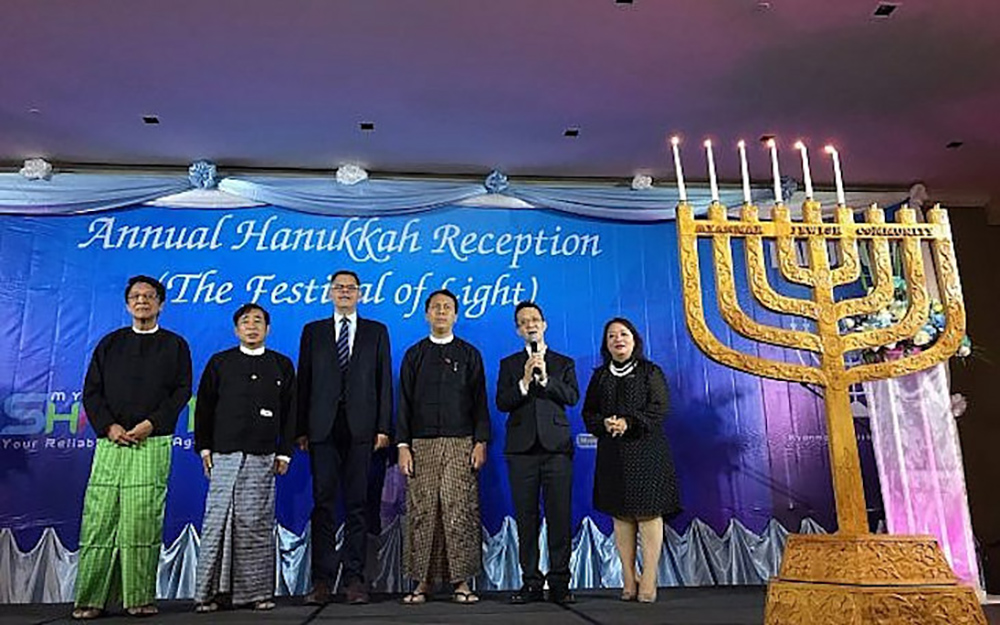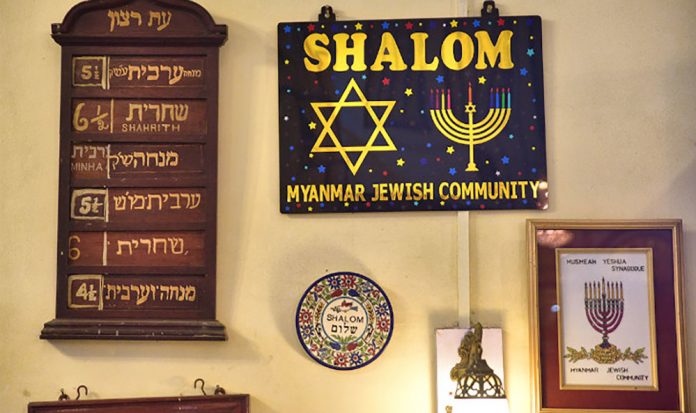Here are some little-known facts about Myanmar, Jews, and the Jewish state.
In the early 1800s, Jewish traders – primarily from India and Iraq – began to venture into present-day Myanmar. The first Jew to live permanently in the country is said to have been an Indian Jew named Solomon Gabirol, who served as a commissar in the army of King Alaungpaya, the 18th Century Burmese monarch who established the Konbaung Dynasty, which ruled Burma until 1885.
Once British forces entered Burma in the 1820s, there are records of some Jewish traders working in the country. One of them, Solomon Reinman, moved from Galicia to the bustling city of Rangoon in 1851, where he traded teak and bamboo. Reinman later moved to the Indian city of Cochin, which had a Jewish community at the time, married, and spent 25 years there. Late in life, he returned to Europe, moved to Vienna and wrote a Hebrew-language account of his travels called Masot Shelomo, or Travels of Solomon. It was one of the first western accounts of Myanmar.
Bringing Baghdad Jewish Culture to Burma
By the mid-1800s a large community of Jews from Baghdad lived and worked in Burma. Writer Ruth Fredman Cernea, author of Almost Englishman: Baghdadi Jews in British Burma (Lexington Books: 2006) notes that these Jewish traders came “as an extended family,” and used their extensive social and familial connections to facilitate trade throughout Asia.
In addition to trading a range of goods, she notes, “They also serviced the ships that docked in the busy Rangoon harbor. Some entered the civil service as government officials and customs officers; others worked as clerks in Baghdadi stores on Mogul or Dalhousie Streets (in Rangoon). Even as they became more comfortable in Burma, the Burma Jewish community was an intrinsic part of the broader Baghdadi world that existed throughout Southeast Asia…. Rangoon or Mandalay (another Burmese city) might be their mailing address, but their ‘home’ could not be so easily defined or confined.” These Jewish traders brought a slice of Baghdadi Jewish life to their new homes overseas.
Jewish Cultural Mixing
Soon, other Jews began to settle in Burma. Ruth Fredman Cernea notes that although the Baghdadi Jews were sophisticated traders, their English was often poor and prevented them from working for Burma’s new British colonizers. Instead, it was Indian Jews – from the city of Cochin which had long been home to a thriving Jewish community and poorer Bene Israel Jews from smaller towns and villages – who were often more fluent in English and who found it easier to work for the British.
Indian Jews soon could be found in Rangoon working as clerks both for British colonialists and Baghdadi Jewish traders. Some Bene Israel workers labored at the docks in the Burmese port of Mandalay.
Arook Thayin: Chicken Croquettes Burmese Style
Food historian Claudia Roden notes that culinarily, “It was Jews of Baghdadi origin who organized the congregation (of Burmese Jews), and it is their style of cooking that influenced the Jewish style that developed locally.” She supplies this recipe as an example of the Burmese style of Jewish cooking that developed in Burma.
- 4 scallions, very finely chopped
- ½ – 2 fresh green chilies, seeded and very finely chopped
- ¼ cup chopped coriander leaves
- 3 chicken-breast fillets weighing about 12 oz (350 g)
- 3 T flour
- 4 eggs
- Juice of 1 ½ inch (4 cm) piece of fresh ginger, crushed in a garlic press, or the grated pieces
- Salt
- Light vegetable oil for deep-frying, about 1 inch (2 ½ cm) deep
Chop the scallions, chilies (“half a chili is enough for me,” Claudia Roden notes), and coriander in the food processor. Hen add the chicken, flour, eggs, ginger, and salt, and process until the chicken is finely chopped and all the ingredients are well blended. Chill, covered, for 1-2 hours.
Deep-fry by the heaping tablespoon (dip the spoon in oil so that the mixture does not stick) in medium-hot oil turning over once, until browned all over. Drain on paper towels. The recipe makes about 14 2 ½ inches (6 cm) fritters and up to 36 tiny ones. Serve hot or cold.
(From The Book of Jewish Food: An Odyssey From Samarkand to New York, Claudia Roden: 1996.)
Azariah Samuel
One of the first Baghdadi Jews to settle in Burma moved to the remote city of Akyab (later called Sittwe), a port city on the Bay of Bengal. Cut off from Jewish communities, Azariah nevertheless came prepared to live a religious Jewish life. He traveled with his own shochet or Jewish ritual slaughterer, to ensure that he and his family could have a supply of kosher meat, and seemingly never compromised his Orthodox Jewish lifestyle.
Azariah’s family eventually numbered five children. He and his wife built a Jewish cemetery, which still exists in Sittwe; one of their sons tragically died in childhood and is buried there. As a Jewish community grew up in the Burmese capital, Rangoon, the Samuel family would sometimes travel there for Jewish festivals, or else host other Burmese Jews in Akyab. By the 1880s Azariah Samuel was a prominent businessman in the town. His son Samuel Haim Samuel took over many of his father’s properties, which included a wine store and cinema. Samuel Haim was also a shochet, having learned the trade from the shochet his father first brought with him to Burma.
The entire Samuel family left Burma in 1931, moving to the Indian city of Calcutta, and eventually moving on to Australia and London.
Working in the Royal Court
Other Jews traveled to the royal city of Yadanabon, also known as Mandalay or “The City of Gems” to work in the Burmese royal court there. Jewish merchants Aaron Jacob Elias Aaron and his son David Hai Aaron were royal accountants working for King Mindon.

In 1878 King Mindon’s son Thibaw was crowned. A bloody ruler, he tried to regain his kingdom from the British and was eventually defeated and forced into exile in 1885. Through these long years of fighting and bloody mayhem, a Jewish community managed to hang on in Mandalay.
Saul Reuben Hakham Rabbi Sasson arrived in the royal city in 1878 along with his son Mordechai Saul. The pair had just traveled from Baghdad on a bizarre errand. Mordechai Saul was engaged to marry his teenage second cousin Seema, but Seema and her family fled Baghdad after a bandit – the family said an Arab sheik – kidnapped Seema’s older sister and held her for ransom.
Reunited in Mandalay, Mordechai Saul and Seema married. Seeking permission to set up a business in the royal city, Mordechai Saul petitioned for an audience with King Thibaw. He wanted to make a good impression, so he brought with him some bottles of expensive perfume he’d carried to Burma all the way from Baghdad, and presented them to Queen Supaylat as a gift. Delighted with the beautiful bottles – and presumably unfamiliar with the concept of perfume – Queen Supaylat opened them, poured the perfume out onto the floor, and declared herself delighted with the beautiful flower-holding bottles which she had placed in front of the palace’s Buddha statue.
Mordechai and Seema Saul quickly traveled to Baghdad to buy more perfume bottles, and for years they operated a store on the palace grounds, selling perfume so that Burmese customers could enjoy the beautiful bottles, just as Queen Supaylat had done.

Musmeah Yeshua Synagogue
In 1854 the small Jewish community of Rangoon built a synagogue, Musmeah Yeshua Synagogue. In 1896, when the city’s Jewish population had swelled to over 200, the community rebuilt the synagogue out of stone. The building bears a striking resemblance to the Magen David synagogue in Calcutta in India: one visitor described it as having a “soaring ceiling, memorial lamps suspended in midair and pale beams over a central carved bimah located in the center of the prayer hall, surrounded by benches for the worshippers. Above them is a women’s gallery.”
Glory Days in the 1930s
By the 1930s, about 3,000 Jews lived in Burma, most in Rangoon, the country’s new capital. A second synagogue, Beth El, was built there in 1932. Then known as Yangon, the capital city even had a Jewish mayor in the 1930s: local businessman David Sofaer.
Locals have recalled that “Jewish restaurants, pharmacies, and schools once marked the city’s streets.” Even today, some buildings in downtown Rangoon boast Jewish stars on their facades, a hint that years ago they might have been owned by Burmese Jews.
Burma was devastated during World War II when it was bombed and invaded by Japan. Nearly all of the country’s Jews fled, moving to India, present-day Israel, and elsewhere. After the war, a few hundred Jews returned, but they nearly all left the country as it pursued repressive policies. By 2010, only about 20 Jews remained in all of Rangoon.
Burmese-Israeli Friendship
Burma and Israel each gained independence in 1948, and the two countries forged a close relationship in the 1950s. In 1955, Burmese Prime Minister U Nu became the first foreign prime minister to visit Israel.
Journalist Joe Freeman notes that this was an immensely important event. “Today, it’s difficult to revive the importance of his act, but at the time, it was highly significant. U Nu was a major figure among leaders of non-Western countries, many of which had opposed Israel’s establishment.” That same year, Israel appointed its first envoy to an Asian country, naming David HaCohen Israel’s minister to Burma.
Israeli Prime Minister Golda Meir wrote extensively about Burma in her autobiography My Life (1975). “I think there was no developing country in the world…with which we conducted such an ardent love affair. For years there seemed to be nothing about Israel that the Burmese did not admire or want to emulate…” Golda Meir organized visits of Burmese people to Israel so they could learn from the Jewish state. Sharing a hostile border with China, it was especially instructive for Burmese civilians to learn how Israel managed to survive surrounded by hostile Arab neighbors.
In 1961, Golda Meir and her husband Menachem visited Burma. “I could…hardly believe that I was not dreaming when we landed at a northern airport and all the Burmese wives and children who had once been in Israel greeted me with Hebrew songs and Israeli flags. I don’t think I will ever forget walking up to one of the little houses in Namsang and saying in Hebrew to a young Burmese who stood in the doorway: ‘Shalom, ma nish ma?’ (‘Shalom, how are things?) and hearing him answer, like a real Israeli, ‘Beseder, aval ein maspeek mayim.’ (‘Fine, but there isn’t enough water.) I might have been in (the Israeli city) Revivim,” Meir recalled.
Last Jews in Rangoon
For the past six years, it’s fallen to one man, a Burmese Jewish entrepreneur in his 40s named Sammy Samuels, to maintain Rangoon’s Jewish sites. He took over leadership of Burma’s Jewish community in 2015, when his father Moses, who was the leader, passed away.

Sammy’s Burmese name is Aung Soe Lwin, and he’s one of perhaps twenty Jews who still live in the city. These days, nearly the only visitors to Burma’s Jewish sites are tourists. Despite the almost total lack of local Jews, Sammy is optimistic about Jewish life in Burma today. “People (here) would not understand what ‘anti-Semitism’ is,” he explains; “Thank God, there’s no such word here.”
By: Dr. Yvette Alt Miller ( Aish.com)












